British navy seizes Iran missiles, parts likely Yemen bound

The British navy seized anti-tank missiles and fins for ballistic missile assemblies during a raid on a small boat heading from Iran likely to Yemen, authorities said Thursday, the latest such seizure in the Gulf of Oman.
The seizure by the Royal Navy comes after other seizures by French and U.S. forces in the region as Western powers increase their pressure on Iran, as it now enriches uranium closer than ever to weapons-grade levels. It also comes as regional and international powers try to find an end to the yearslong war gripping Yemen, the Arab world’s poorest country, and as Iran arms Russia in its war on Ukraine.
The raid took place Feb. 23 after an American aircraft detected a small motorboat with cargo covered by a gray tarp heading from Iran, with a helicopter from the Royal Navy frigate HMS Lancaster chasing the vessel as it ignored being hailed by radio, the British Defense Ministry said. The boat tried to reenter Iranian territorial water, but was stopped before it could.
Inside the boat, British troops found Russian 9M133 Kornet anti-tank guided missiles, known in Iran as “Dehlavieh,” the U.S. Navy’s Mideast-based 5th Fleet and the British navy said. Those weapons have been seen in other seizures suspected to be from Iran and bound for Yemen.
Also on board were small fins that the U.S. Navy identified as jet vanes for medium-range ballistic missiles. Also on board were devices the Navy identified as “impact sensor covers” that go on the tips of those missiles.
While the British did not identify where it suspected the weapons would go, the U.S. Navy described the seziure as happening “along a route historically used to traffic weapons unlawfully to Yemen.”
Iranian components have helped build a missile arsenal for Yemen’s Houthi rebels, who have held the country’s capital, Sanaa, since 2014.
A United Nations resolution bans arms transfers to Yemen’s Iranian-backed Houthi rebels. Tehran long has denied arming the rebels, despite physical evidence, numerous seizures and experts tying the weapons back to Iran.
“This seizure by HMS Lancaster and the permanent presence of the Royal Navy in the Gulf region supports our commitment to uphold international law and tackle activity that threatens peace and security around the world,” British Defense Secretary Ben Wallace said.
Vice Adm. Brad Cooper, the commander of the American 5th Fleet, said in a statement that this was the “seventh illegal weapon or drug interdiction in the last three months and yet another example of Iran’s increasing malign maritime activity across the region.” In that time, the Navy said, its sailors and allies have seized more than 5,000 weapons, 1.6 million rounds of ammunition, 30 anti-tank missiles and other weapon components.
Iranian state media did not immediately acknowledge the seizure. Iran’s mission to the United Nations did not immediately respond to a request for comment.
The war in Yemen has deteriorated largely into a stalemate and spawned one of the world’s worst humanitarian crises. However, Saudi-led airstrikes haven’t been recorded in Yemen since the kingdom began a cease-fire at the end of March 2022, according to the Yemen Data Project.
That cease-fire expired in October despite diplomatic efforts to renew it. That has led to fears the war could again escalate. More than 150,000 people have been killed in Yemen during the fighting, including over 14,500 civilians.
AP













